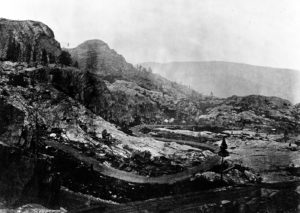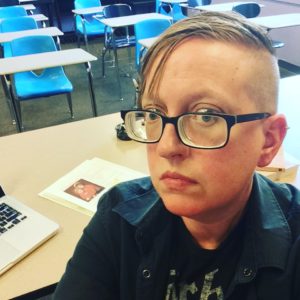 Over winter break I spent some time listening to a podcast and reading a book about The Donner Party.
Over winter break I spent some time listening to a podcast and reading a book about The Donner Party.
While I would like to say I became spontaneously interested in Westward Expansion or the notion of Manifest Destiny, the truth is a friend made a reference to the Donner Party during a conversation and I was reminded of this little American History blip that I’d taken for granted, imagining, as a kid, it was just a bunch of weirdo bonnetted pioneers in covered wagons gnawing on cold human bones.
Suddenly, in winter, in the Southwest, I was thinking about how 19th century East Coasters or Midwesterners migrated.
In the 19th century, after the migration from Germany or England or Ireland or France to Illinois or Iowa or Indiana or Ohio, my ancestors stayed put. Save for a cousin in Los Angeles, I am, as far as I know, the only of my close relatives to “go west” of Missouri.
I got interested in the Donner Party mostly because of the cannibalism thing, but also because I was curious about how people survived the journey from the Midwest to California. My wife and I listened to a podcast about the ill-fated journey, and I stayed up late reading Daniel James Brown’s The Indifferent Stars Above.
By the time winter break ended, I knew that before they took to eating one another, panicked members of the Donner Party ate mice, a Grizzly bear, and parts of the hide they used to insulate their bodies and makeshift cabins. I learned the average healthy human being can actually survive three weeks without food, but, unaware of this, the Donner Party only waited two weeks before eating the hearts and livers of their friends and family who had died of hypothermia in the Sierra Nevadas.
Every morning, I had a new factoid for my wife. I told her all about snow blindness, and about the birth control practices of 19th century pioneer women and, “Did you know before you die of hypothermia you actually get really warm?”
Each bit of trivia, no matter how dull to my wife, resulted in a lengthy conversation.
All my life I’ve been prone to these little obsessions. Some last longer than others. As for the Donner Party, I think I’ve had my fill. And as with all obsessions that come and go I seldom know what to do with the acquired information. As a writer, sometimes I can extract metaphor from the trivia, use the ephemera to extend an idea, but more often than not I’m left with utterly unusable knowledge about Mary Todd Lincoln or tarantula hawks or the bubonic plague.
I tell my students that knowledge isn’t just for having, it’s for using. So what do we do with all the knowledge we acquire but cannot use? Especially in the so-called information age, where nearly every curiosity might be satisfied by a Google search, where do we put all that we know?
Much has been said of how our access to seemingly infinite knowledge disconnects us from one another more than it brings us together. I think there’s plenty of evidence to support this. Through social media, I know what distant acquaintances ate for dinner, but I don’t know the more important thing — what’s in their hearts and minds. So I started thinking about how information can bring us closer to connection:
“What do you know?” I asked my Intro to Creative Writing class.
The first student who had to respond squinted skeptically at me. “About what?”
“Anything,” I said. “Just tell me something you know.”
“There’s a species of fish called Humuhumunukunukuapuaa.”
“The Challenger exploded because of an O ring.”
“Fortnite is also a word, fortnight – spelled different. Can I write it on the board?”
Everyone knew something.
The responses were utterly random, unrelated, but with each response students were engaged and curious.
“What does Humuhumunukunukuapuaa look like?”
“What’s The Challenger?”
“What is a fortnight?”
They were eager to share and to learn without agenda, without objective. They shared endlessly and, running over time, I had to bring the experiment to a close so we could move on to the day’s lesson about epistolaries; when it came time to write their epistolaries, some wrote poems to the victims of The Challenger, to Hawaiian fish and to time itself.
The gathering of random knowledge is so personal. What we learn of our own accord is intimate — every Google search, every obsession, every independent knowledge quest undertaken at the library speaks to a deeply personal fear, or desire, or challenge, or unique joy and, most of all, a need to connect. “What does a persistent sore throat mean?” or “Why do guppies breed so fast?” or “What was Martha Washington’s favorite color?”
What might life be like if instead of the rote “How are you?” or “What did you do over the weekend? we greeted one another by asking, “What do you know?” In many respects, it’s a far less loaded question than “How are you?” or “How was your weekend?”
Everyone knows something. You might learn something new and fascinating, and even if they know something you already know, or if the information doesn’t particularly interest you, the answer — be it about aquatic life or online gaming — reveals a lot about the person: what frightens them, what compels them, what really matters in their hearts and minds.
Moreover, and most importantly, a real conversation is inevitable.

